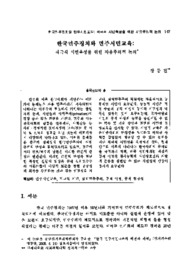

-
미리보기
서지정보
· 발행기관 : 연세대학교 사회과학연구소
· 수록지 정보 : 사회과학논집 / 36권 / 147 ~ 169페이지
· 저자명 : 장동진
초록
민주화 이후 한국사회가 직면하는 여러가지 문제들은 자유 민주사회가 지속되면서 나타나는 다원주의 현실에서 기인하는 불일치의 문제, 시민들의 사적주의(privatism)의 경향 등과 깊은 관련을 가진다. 민주화 이후 한국사회의 갈등은 빈부격차, 사회갈등 등 사회 경제적인 것에서부터 보수/진보 등 이념 및 신념의 성격을 지닌 것들에 이르기까지 다양하게 나타나고 있다. 이러한 문제들은 한국의 정체성과 한국민주주의에 대한 근본적 반성을 불러일으키고 있으며, 한국에서의 진보/보수의 담론은 이러한 근본적 반성과 연관된다. 이러한 근본적 반성과 관련한 복잡한 갈등의 발생은 현대 심의민주주의 이론가들이 이성적 토론을 통한 공공성의 회복을 강조하는 것과 깊은 연관성을 지닌다. 심의민주주의의 핵심에는 자율적이고 능동적인 시민이 요구된다. 능동적 시민은 적정 수준의 공적 이성의 능력과 시민성의 덕목을 갖추는 것이 요구되는데, 국가야말로 시민의 공적 이성의 능력을 증진시킬 수 있는 덕목 및 기술 향상과 관련한 시민성 고양교육을 실시할 수 있다. 시민적 교육은 자유민주사회의 안정성을 도모하고 이러한 사회를 끊임없이 재구성 할 수 있는 능력을 지닌 적극적 시민성을 육성하게 한다. 현재 민주화 이후에 나타나는 한국사회의 문제들을 극복하기 위해, 한국 시민에게는 적절한 공적 이성의 행사능력과 시민상호간의 자발적 존중을 실현할 수 있는 시민성의 함양이 동시에 요구된다.영어초록
The so-called 'problems after democratization' in Korea show a great similarity whith the problems of moral disagreement and civic privatism that contemporary Western democracies are mostly experiencing nowadays. As a way to overcome these problems in Western democracy, deliberative democracy attempts to combine reasoned discussions with political decisions. This theoretical exploration in Korean democracy raise an importance of debates for empowering citizenship along with elaboration of political institutions and enhancement of leadership.
The Korean problems after democratization involve civic privatism, social-economic conflicts, and also conflicts arising from diversification of individual beliefs and ideological difference. The phenomena of civic privatism in Korea have pervaded through individual egoism, weakening of political participation, group and regional egoism. Furthermore, growing civic privatism in Korea has contributed to developing social and economic problems into a more complicatedly deepening stage, aggravating the gap between the rich and the poor, cconflicts between capital and labor, and regionalism expressed through the voting behaviors in nationwideelections for presidency, national assembly, and local politics. And a diversification of personal beliefs and ideological differnece poses a dilemma of moral disagreement in Korea democracy. And also we witness an initial stage of multicultural conflicts and the expanding of feminism discourse in theory and practice, which accelerate moral disagreement in Korean society. These new problems demand a comprehensive reflection on Korean democracy and identity.
This comprehensive reflection raises a practical question how to maintain political stability as well as to manage the common good of Korean society. This question raises again what kind of new citizenship for sustainable Korean democracy. This concern has something to do with the ideas of deliberative democracy which the role of active citizenship is prerequisite to. Active citizenship needs a citizen of public reason and civic virtues. For empowering citizenship, the government can initiate civic education in a following way that does not hurt autonomy of citizens. First of all, the government can provide democratic education for cultivating civic virtues, which aims to improving the capability of public reason. The education for public reason is related to the enhancement of critical reflection for a better reproduction of political society. Second, democratic education can provide programs for civility which contribute to mutual respect and recognition among citizens. Civility is expressed through daily life attitudes among citizens. A decent civility can contribute to strenghtening civic solidarity. Third, the enhancement of the capability of public reason and civility requires more fundamental democratic education for respecting human rights and human beings. Political society needs an active citizenship which is required again for critical reproduction of political society.참고자료
· 없음태그
-
자주묻는질문의 답변을 확인해 주세요

꼭 알아주세요
-
자료의 정보 및 내용의 진실성에 대하여 해피캠퍼스는 보증하지 않으며, 해당 정보 및 게시물 저작권과 기타 법적 책임은 자료 등록자에게 있습니다.
자료 및 게시물 내용의 불법적 이용, 무단 전재∙배포는 금지되어 있습니다.
저작권침해, 명예훼손 등 분쟁 요소 발견 시 고객센터의 저작권침해 신고센터를 이용해 주시기 바랍니다. -
해피캠퍼스는 구매자와 판매자 모두가 만족하는 서비스가 되도록 노력하고 있으며, 아래의 4가지 자료환불 조건을 꼭 확인해주시기 바랍니다.
파일오류 중복자료 저작권 없음 설명과 실제 내용 불일치 파일의 다운로드가 제대로 되지 않거나 파일형식에 맞는 프로그램으로 정상 작동하지 않는 경우 다른 자료와 70% 이상 내용이 일치하는 경우 (중복임을 확인할 수 있는 근거 필요함) 인터넷의 다른 사이트, 연구기관, 학교, 서적 등의 자료를 도용한 경우 자료의 설명과 실제 자료의 내용이 일치하지 않는 경우
“사회과학논집”의 다른 논문도 확인해 보세요!
-
서비스지향적 디지털기술이 고객애호도에 미치는 영향분석 23 페이지
본 연구는 인터넷비즈니스 서비스지향적 디지털 기술(service-oriented digital technology)과 성과(고객애호도)간의 관계에 있어서 전반적 서비스품질, 고객만족 변수의 매개적 역할을 검증하고, 서비스지향적 디지털 기술이 이러한 매개변수를 통해 성과(고객애호도)로 연결될지를 검정하였다. 검정결과는 다음과 같다. 첫째, 서비스지향적 디지털.. -
현행 합동평가제도의 개선방안 26 페이지
1980년대 중반 이후 민주화, 정보화가 급속히 진행됨에 따라, 행정에 대한 국민의 요구가 증대되어 정부는 한정된 재원을 효율적으로 사용하여 양질의 서비스를 제공 할 필요성을 느끼게 되었다. 따라서 많은 나라들은 공공부문의 성과관리를 통해 효율성과 경쟁력을 제고하여 납세자에게 양질의 행정서비스를 제공해야 한다는 '신공공관리운동'을 본격적으로 추진하게 되었다.. -
정치체제, 발전전략, 그리고 복지제도: 산업화시기 일본, 대만, 한국의 비교 26 페이지
이 글은 산업화시기 동아시아의 복지 저발전국들 -일본, 대만, 한국- 내에서 복지 발전의 수준이 상당한 편차를 갖는 이유를 정치경제학적 접근을 통해 설명한다. 민주적 제도가 결핍된 권위주의체제와는 달리, 일본에서 복지제도의 도입과 복지지출의 확대과정은 정당 간 선거경쟁의 다이나믹스에 의해 영향을 받을 수밖에 없었다. 그 결과 일본의 복지제도화와 공적복지 지..
문서 초안을 생성해주는 EasyAI

